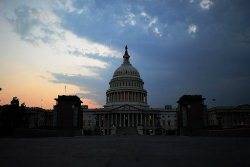The Republican-led House of Representatives has approved the use of force if Iran threatens the US and its allies with nuclear weapons.
By a vote of 299-120, legislators on Friday passed the sweeping legislation, which sets out a total of $642.5bn in military expenditures for the coming fiscal year.
According to a section of the National Defence Authorization Act, "It shall be the policy of the United States to take all necessary measures, including military action if required, to prevent Iran from threatening the United States, its allies or Iran's neighbors with a nuclear weapon."
The bill including the tough Iran language was passed just a day after a non-binding but sharply worded House resolution put pressure on President Barack Obama to prevent Tehran from pursuing its nuclear program and reject policy merely aimed at containing a nuclear weapons-capable Iran.
Friday's measure would make the possible use of force a key plank in US policy to prevent Iran from acquiring an atomic bomb.
The bill would still need to pass the Democratic-controlled Senate, where Obama's allies are highly unlikely to pass the House version without substantial changes.
Obama has already threatened to veto the measure if it prevents his administration from carrying out its defense strategy.
The House legislation would require the US military to prepare a plan to boost the presence of the US Navy's Fifth Fleet in the Middle East, and conduct military exercises "or other visible, concrete military readiness activities".
Iran and the P5+1 powers - Britain, China, France, Russia and the US, plus Germany - are preparing to meet next week in Baghdad for crunch talks on Tehran's contested nuclear program.
The UN nuclear chief will fly to Tehran on Sunday in an apparent bid to secure a deal enabling his inspectors to probe suspicions of atomic bomb research, a few days before Iran and world powers meet.
Western powers and Israel say Iran is masking an ambition to obtain nuclear weapons under cover of a civilian energy program, a charge Tehran vehemently denies.
Support for sanctions
Meanwhile, a poll released on Friday said opposition to Iran obtaining nuclear weapons is widespread around the world, including in neighboring countries Egypt, Jordan and Turkey, and support for tough economic sanctions is high.
Support for military intervention to prevent Iran from going nuclear is more divided, the Pew Global Attitudes survey of 21 nations found.
Among the countries polled, support was highest in the US at 63 per cent and lowest in Russia at 24 per cent, while at least 50 per cent of the people surveyed in Britain, France, Germany, Spain, Italy, Poland and the Czech Republic favored military action.
Greece and Turkey are the only NATO members where a majority of people surveyed either did not support military intervention, or had no opinion, though majorities in both countries oppose allowing Iran to obtain nuclear weapons.
Pakistan had the highest support for Iran's nuclear ambitions, at 50 per cent.
The poll found that the Shia minority in Lebanon overwhelmingly supports Iran's nuclear program - 73 per cent - though a strong majority of the religiously divided Lebanese population opposes it.
Iranian President Mahmoud Ahmadinejad received highly negative ratings in Jordan, Egypt, Turkey and Lebanon, though nearly half of Pakistanis viewed him favorably.
The poll, which surveyed 26,210 people in 21 countries between March 17 and April 20, found that clear majorities of Americans of all political leanings - Republicans, Democrats and independents - support military action in Iran.
PHOTO CAPTION
The US Capitol Building is pictured at dusk in Washington, DC.
Al-Jazeera


 Home
Home Discover Islam
Discover Islam Quran Recitations
Quran Recitations Lectures
Lectures
 Fatwa
Fatwa Articles
Articles Fiqh
Fiqh E-Books
E-Books Boys & Girls
Boys & Girls  Women
Women










